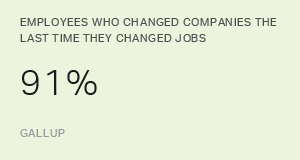Do you know how many of your employees are looking for another job?
According to Gallup's 2017 State of the American Workplace report, 51% of currently employed adults in the U.S. say they are searching for new jobs or watching for new job opportunities. What's more, they are optimistic about their chances: 47% of workers say now is a good time to find a quality job.
It hasn't always been this way. In 2012, only 19% of the American public agreed that it was a good time to find a quality job. In short, employees today believe a better job is out there waiting for them -- and one in two is looking.
Organizations that rely on world-class talent must find more creative ways of re-recruiting their top performers, even when traditional incentives (i.e., pay and promotions) are not immediately available. With 50% of your workforce on the line, here are a few ideas to re-recruit your high performers and avoid turnover.
Help Your Stars Find Another Job With You
In today's work world, it is implicit that "looking for another job" means "looking for another job somewhere else." According to Gallup analytics, 91% of employees say the last time they changed jobs, they changed companies to do so. And employees still leave organizations that they believe in, where they love the pay and perks, and where they have been productive. The reason? Many people leave because of bad managers.
Unfortunately, one sign of a bad manager is an inability to let their best people move and change. Leaders in charge of retaining talent must make sure that employees know they have options to stay within the organization -- even if that means creating new job descriptions -- without having to leave.
Show Your Stars How They Can Grow With You, Not Outgrow You
Growth is not only for the young, outwardly ambitious or competitive -- all human beings have a need to learn and grow. (And this includes late-career baby boomers!) Development conversations do not need to focus on pay or promotions to be meaningful. Growth can mean learning new skills, collaborating with new teams, getting to travel, having greater autonomy or mentoring new employees.
Today's employers must learn to adapt and personalize career paths in ways that make sense for the people on them. Don't assume; ask!
Onboard Your Stars Again
You may think your perks are helping retain employees -- but are workers actually taking advantage of those perks? You may think your employees know what your mission and values are, but do they? If your current employees are not "on board," it may be time to reintroduce your employer value proposition. What promises do you make to your employees? What can they expect to gain from their experiences in your organization?


